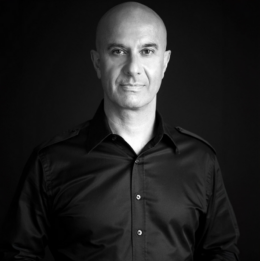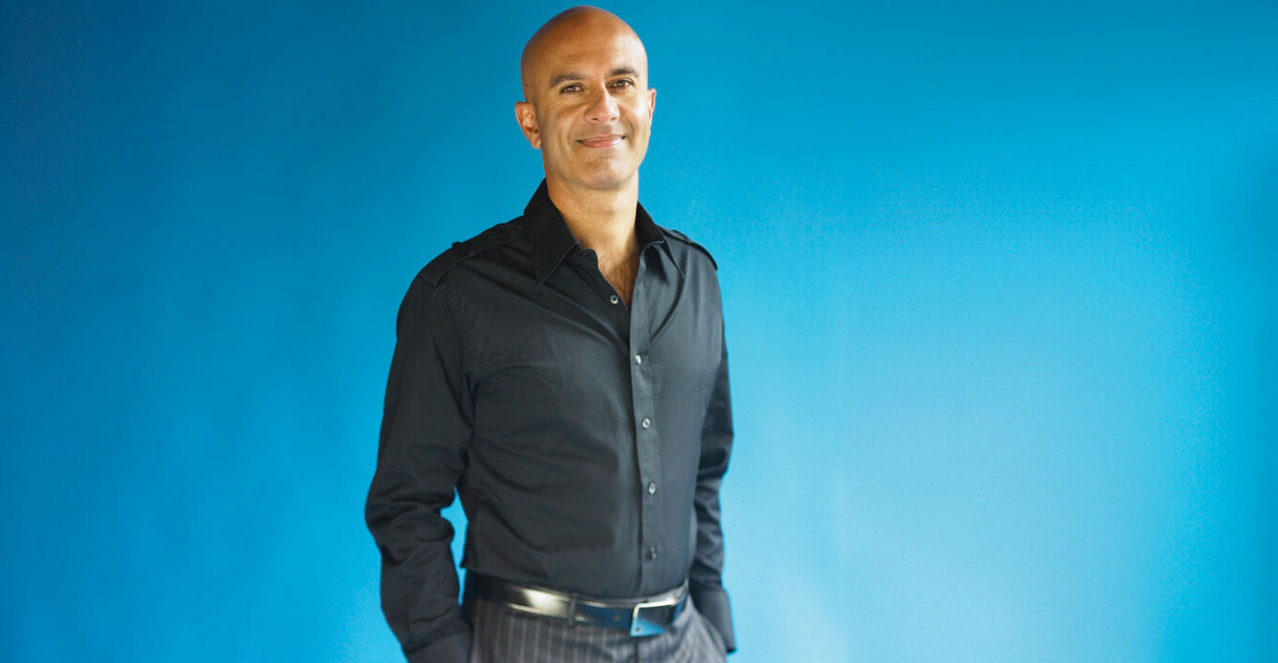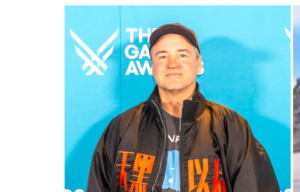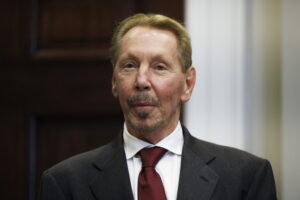When you meet Robin Sharma in person, the first thing that impresses you is his disarming kindness. Grounded, smiling, and calm, this man, whose books have sold over 20 million copies worldwide and have been translated into over 70 languages and dialects, does not belong to the category of self-help gurus who use aggressive language to convey the ‘dynamism’ of their message. Moreover, he does not particularly like the title of ‘guru’ and prefers to be called a ‘specialist in cultivating leadership skills,’ with a life mission to help people unfold their hidden talents and become the best version of themselves.
The successful author and ‘teacher’ of leaders was in Greece on Friday, May 24, for the presentation of his new book ‘The Wealth Money Can’t Buy,’ (published by “Dioptra” in Greece), and he spoke to protothema.gr about the reasons that keep us ‘locked’ in a life that does not satisfy us, the impact of ‘energy vampires’ on our daily lives, and the ‘words of wealth’ that can dramatically change our worldview.
Drawing from his 30-year experience as a mentor to many billionaires, top athletes, and artists, he reveals the habits of these individuals that led them to success and warns how easy it is to fall into the trap of obsessively pursuing money, ending up alone, empty, or sick.
He also explains what ‘Project X’ is, which can give meaning to each of our lives, and why it is important to remind ourselves every day that…we will die!
Who is Robin Sharma
Approximately 35 years after abandoning his promising career as a lawyer to fulfill his mission as a mentor to leaders, the now 59-year-old Sharma has many reasons to be proud. Many of his best sellers, such as “The Monk Who Sold His Ferrari” and “The 5 AM Club,” are considered by many to be landmark books in the field of self-improvement. Corporate giants like Nike and Microsoft, educational institutions like Yale University, and organizations like NASA have at times enlisted his consulting services to train and inspire their staff. Famous entrepreneurs (such as Richard Branson), authors (such as Deepak Chopra), and celebrities (such as Taylor Swift and Jon Bon Jovi) have declared themselves fans of his work. His speeches around the world attract thousands of people, as evidenced by his appearance in Athens a few months ago. Adding to all this is the charitable work of his foundation for children, making it clear that for Robin Sharma, encouraging his readers to work towards leaving their mark on the world is not just words but a way of life.
In his latest book, titled “The Wealth Money Can’t Buy,” the Indian-Canadian author presents a new philosophy and methodology for success and self-fulfillment.
The book is based on the idea that there are eight forms of wealth (money being only one of them) that are key to a life of “abundance and beauty.” Structured in short chapters designed as personal daily counseling sessions, the book contains guidelines and inspirational stories for each of the following eight core areas: Evolution, Wellness, Family, Art, Money, Community, Adventure, and Contribution.

Read below the full interview Robin Sharma gave us during his recent visit to Greece:
– Mr. Sharma, in your book “The Wealth Money Can’t Buy,” you give examples of very successful people who have achieved happiness, but you also mention cases of people who are, as you say, “rich in money and poor in quality of life.” What are the main differences between these two categories of people?
The first difference, I would say, is this: People who live truly rich lives focus on all forms of wealth. Those who are “rich in money and poor in quality of life” are often individuals obsessed with acquiring money. They have bought into the sleepwalking culture that tells you if you make a lot of money, you’ll be happy. If you are obsessed with money, you may end up with a lot of it, but there may be other consequences, such as to your health. Many of the billionaires who have sought my guidance end up sick because they were so dedicated to their business mission that they neglected their health. Therefore, people who truly live rich lives seek out all 8 forms of wealth and understand, contrary to the ideas promoted by our culture, that winning in life has to do with more than just money.
– In your book, you present strategies and tools that one can use to acquire these 8 forms of wealth. How can we start implementing these changes in our lives?
As the title of one of the early chapters of my book says, “The best start is to get started.” Recently, a radio host in Dubai asked me the same question. How do we start? My answer is that the best start is to get started. We tend to overcomplicate things. How do you start writing the book that will change the world? You write the first page. How do you start fulfilling your dream of becoming a marathon runner? You get off the couch and take a walk. How do you start the search for the love of your life? You strike up a conversation with the stranger next to you at the supermarket. The Chinese philosopher Lao Tzu once said, “The journey of a thousand miles begins with the first step.” My belief is that small daily improvements, applied consistently over time, will lead to remarkable results. My book contains hundreds of tools: Choose one today and start applying it daily. If tomorrow you feel like quitting, show perseverance. A few days later, if you fail, forgive yourself, take maybe a day off, and continue until you establish this habit that will ultimately become part of your life.
Δείτε αυτή τη δημοσίευση στο Instagram.
– Why do you believe that people tend to procrastinate changes in their lives, even if they realize that what they are doing is not working? Is it because of the fear we feel, or perhaps because we consider that we have unlimited time ahead of us?
You read my mind. I think both of these reasons are true. Human beings are procrastinators. We say, “I’ll exercise, I’ll find love, I’ll achieve financial prosperity, I’ll become happy someday in the future, but for now, I have many things to do. I have my whole life ahead of me.” That’s simply not true. Who knows what tomorrow will bring? Pandemics and wars are part of life, accidents are part of life. We delude ourselves if we think we have unlimited time ahead of us. Yet we postpone things because we are busy. Secondly, in our minds, we may think that we want to do a lot of things, that we want a rich life, that we want to be happy and healthy. However, we often struggle with our fears. Not only fear. Yes, we fear change, we fear failure, but many of us also have emotional wounds. We tried in the past to do something great, failed, experienced pain, and now we have associated the pursuit of goals with pain. A third factor is that often, our daily behavior reflects the perception we have of ourselves. So, we may think we want all these amazing things, but we have a psychological narrative that we don’t deserve them. And we also have a psychological narrative or the belief that great athletes or happy people or people who live wonderful lives are somehow different from us. They are not different; they just do different things.
– There are also references in your book to the different things that rich and successful people do, specifically to their habits. Can you mention some of these habits?
This chapter refers to the fifth form of wealth, which is financial wealth. Some things that I mention that billionaires do are as follows. First: They don’t care about the opinion of others. What do most of us do? We think of an idea for a new business, or a way to become healthier, and we share it with someone. As soon as they laugh at us, or tell us that our plan is not practical and that we are not cut out to succeed, we believe that opinion. Economically successful people have a vision and protect it from attempts at ridicule or mockery by their critics. It’s very important. Many times, we do something special or believe in something special and immediately as soon as we receive criticism, we believe the criticism. The second habit has to do with the fact that these people understand that personal development determines our external life. They love reading. They like to attend seminars, they have mentors, because they understand that this way they will evolve further. Third, these people are possibilitarians. They constantly take risks and push themselves to do difficult things, to broaden their version of reality. Fourth, these people understand that self-discipline is a muscle. So they establish habits like waking up early, one of the strategies I mention in my book “The 5 AM Club,” to build self-discipline. I would also say that these people are perfectionists. I think of Steve Jobs, who wanted the icons on the iPhone to look so beautiful that they would make users want to lick the screen. And one last thing, these individuals understand that money is the reward for offering magic to the market. To earn a million dollars, you must help a million people (the title of a chapter from the book “The Wealth Money Can’t Buy”).
– In your book, you mention the acronym PENAM (Parents, Environment, Nation, Acquaintances, Media), which represents the forces that shape our worldview. In my opinion, these forces, at least for the first years of a person’s life, are a matter of luck. This doesn’t mean that some people start their lives from a disadvantaged position, and how can one overcome this disadvantage?
You are correct that these five forces shape our worldview. And yes, sometimes this entails difficulties. However, the tools I share show how we can “reprogram” PENAM. For example, applying the MVP technique (Meditation, Visioning, Prayer) every morning will certainly yield results, through the power of neuroplasticity, in changing one’s perspective. The chapter of my book titled “Recruit a Dead Board of Directors” refers to reading books by our heroes. By reading these books, we see how these individuals overcame the challenges they faced, such as how Nelson Mandela faced obstacles, or how an athlete who started from scratch reached excellence. So, this is another tool. Also, one of the central ideas in my book is that “we become our social network.” So, we must free ourselves from energy vampires. There’s the concept of emotional contagion: if you’re around complainers and negative people, their emotions will subconsciously influence your own feelings and how you see the world. Another tool we can use is keeping a journal, writing every morning about what kind of person we want to become. Writing about how we want our day to unfold, our flaws and how we can correct them, even about what needs to happen this year for it to be a good year. This kind of inner work, visioning, and reprogramming will start to change the way we see the world.
What happened to Alexander the Great when he went to ancient Egypt? (video)
Δείτε αυτή τη δημοσίευση στο Instagram.
– Regarding the energy vampires you mentioned earlier, one of the pieces of advice you give to your readers is to keep a distance from toxic people in their lives. This can be difficult when family ties or feelings of love are involved. What would you suggest in these cases?
It’s something I hear very often. Just yesterday, I was in a group coaching call that I was facilitating, and someone said to me, “I’m struggling with the person I’m married to. I love him, but I don’t know what to do. I have great dreams, I have professional success but he’s clipping my wings.” There are some pieces of advice I can give: If it’s a family member, you can have selective engagements with them. Instead of talking every day or exchanging messages four times a week, communicate only once a week. Second piece of advice: Do something drastic and have an open conversation with that person. Say, “Mother, spouse, or dear friend, every time I share something with you that excites me, you almost automatically find a way to clip my wings. I want to be with you, but every time I’m with you, I feel discouraged, possibly without you realizing it. Can you please make some changes in your behavior?” If they don’t make those changes, then you have the choice to leave. Speaking of which, it’s good to remember the trichotomy “reason, season, lifetime.” Not everyone is meant to stay with us for a lifetime. Some people come into our lives for a reason, some for a specific period, some for a lifetime. If you’re evolving very fast as a person, most won’t be able to keep up with you. The last piece of advice I have is this: You can still love a toxic family member, but do it from afar. Sometimes you just need to cut ties with someone because you only have one life to live, and you have to love that person from afar. Send them positivity, but understand that they’re not going to change, and if you want to live a great life, you need to distance yourself. This is an act of leadership, an act of courage, and an act of love for yourself.
– Another question I have to ask you concerns the power of words that you analyze in your book. Why do you advise your readers to stop using weak expressions like “I will try” and to use “words of wealth” instead?
The current culture teaches us the language of victimhood, instead of words that focus on possibilities and real success. Every word we use plants a seed in our subconscious. The way we speak to others and to ourselves determines how we see ourselves. Most of us speak to ourselves worse than we would speak to a dog. And when we tell ourselves “you messed up, you’re not capable, you’re not very smart, you’re worthless, people will realize you’re not worthy,” we continue to erode the image we have of ourselves. I emphasize again, our behavior reflects this image. If you don’t see yourself in a positive light, you won’t wake up at five in the morning (for the morning routine of self-improvement), you won’t push yourself to work, you won’t treat others well because you don’t like yourself very much. So words are very powerful in shaping how we see ourselves. Words are creation, they are influence. The words I use for you when I talk to you will influence you. How did Mandela achieve what he achieved for his nation? To a large extent, he did it through words. In our culture, we use phrases like “You did very well in the presentation. You nailed it.” Or when we really like something, we might say “this thing is sick.” That’s how people talk today. We often use words like “I hate.” “I hate this café.” Words are incredibly powerful. So, when we are aware of the words we use, we become less careless and communicate better not only with others but also with ourselves. I strongly believe in this chapter, which includes dozens of words I suggest someone use (examples: Excellence, Creativity, Magic, Love, I Can, etc.). So one of the ways we can change our lives is by learning to use better words because then we can write better and speak better. And as we write and speak better, we will do better in the world.
– One of the most interesting concepts in your book, at least for me, is that of “Project X,” the one “masterpiece” that you say each person hides within them, and which you advise readers to find and focus all their efforts and resources on perfecting it. How can an ordinary worker who barely makes ends meet approach this goal?
Very good question. You’re right, the concept of “Project X” involves identifying the one unique project that will become your “Taj Mahal,” your “Acropolis.” It’s easier for artists or entrepreneurs, but what about someone who works, for example, in a restaurant? I would say that a job is just a job if we see it as just a job. Every kind of work is deeply dignified. Every kind of work is deeply respectable. I think we live in a world where too many people say they will do great things at work when they become CEOs, when they become famous on TikTok and have all eyes on them, but I believe that true greatness is how you behave when no one is looking at you. So I would say to someone who works in a restaurant or drives a taxi: “Every day you have an opportunity to show yourself how good you are at your job. Every day you have the opportunity to make people’s lives better.” It’s something we forget. In my book, I mention the example of Alberto, a doorman I met at a hotel in Barcelona. He told me he didn’t know if his job had any impact, and I told him he probably boosted the morale of about 100 people a day with his positivity. In the span of a year, he will have influenced and touched tens of thousands of people, in ten years, hundreds of thousands. The goal is to become models of excellence.
– One last question: In “The Wealth Money Can’t Buy,” there are several chapters that reflect the Latin phrase “memento mori” (“remember you must die”), a theme found in ancient Greek philosophy, art, Buddhism, and other religions around the world. Why is it important to remind ourselves that we will die?
Indeed, there are some chapters towards the end of the book that deal with how short life is, e.g., “Experience Your Own Funeral Alive” and “Eat Your Last Supper Today.” When we remind ourselves every morning, while the rest of the world is asleep, that we will die, we live more focused. We don’t postpone things, we are bolder instead of worrying about rejection. We don’t hold ourselves back from expressing love; we tell our relatives and friends that we love them. And we show them that love. At work, we care more about the work we do; there’s a sense of urgency. And I would also say that when we remind ourselves that life is short, we pay attention to the beauty around us. This morning, I experienced something amazing. At 4 a.m., I saw the full moon next to the Acropolis. For me, that sight was magical. So if we knew we had only a week left to live, we would pay attention to the magic everywhere in the world because we would soon leave it behind. And we know this is true because people close to death embrace their loved ones and look at everything around them because they know they won’t be able to do it in the future. By building a ritual – I refer to some of these in my book – that reminds us how short life is, we gain a much richer life.
Ask me anything
Explore related questions





